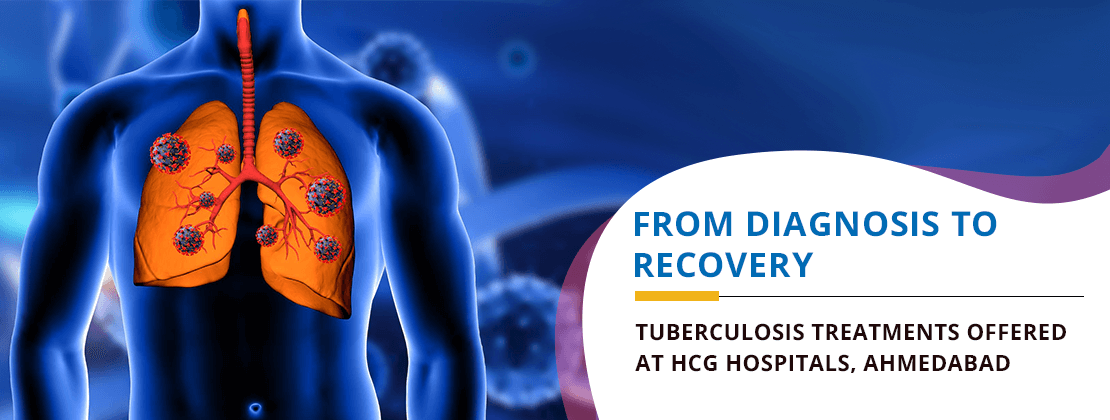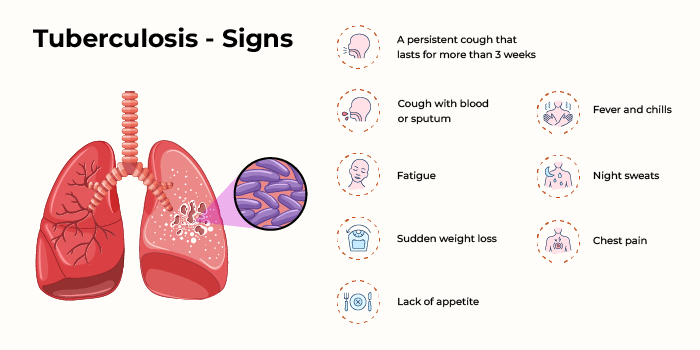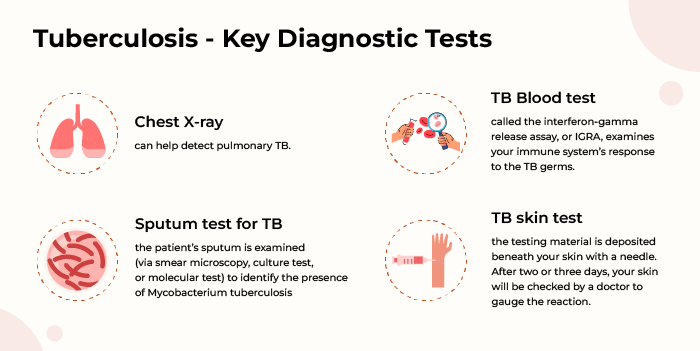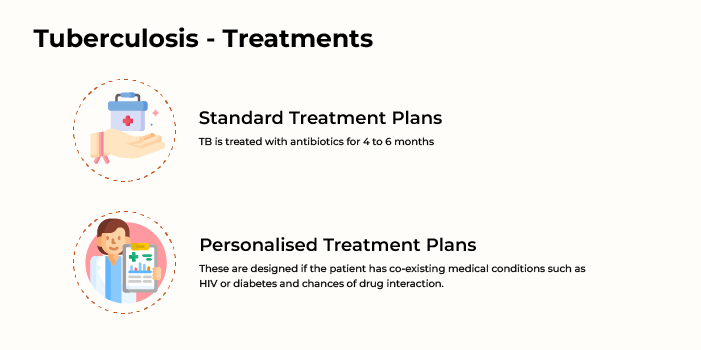
Home / Blog / From Diagnosis to Recovery: Tuberculosis Treatments Offered at HCG Hospitals, Ahmedabad
Table of Contents
Tuberculosis (TB) is preventable and treatable, but it still ranks as the second most lethal infectious disease globally, just after COVID-19.
India has the highest burden of tuberculosis in the world. That is, every three minutes, two Indian citizens die due to TB.
According to the WHO, tuberculosis costs India around $24 billion every year because of lost productivity and healthcare costs.
Our multispeciality hospital in Ahmedabad is focused on rooting out TB since it is a public health problem. The National Accreditation Board for Hospitals and Healthcare Providers recognises our practicing standards.
Tuberculosis is an infectious disease caused by a bacterium called Mycobacterium tuberculosis. It can impact any body part, but the lungs are commonly infected.
There are largely two types of TB: inactive TB and active TB.
If you have inactive TB, there will not be symptoms, and you cannot spread the disease. It is latent. However, if left untreated, it can become active TB.
When your immunity fails, TB bacteria can multiply and attack your body. You will fall ill and infect others. If left untreated, active TB can be deadly.
Tuberculosis prevention measures include staying away from people with active TB and getting treatment for latent TB infections.
Tuberculosis primarily affects the lungs and causes associated symptoms. However, in rare cases, TB can affect other organs like the kidneys, spine, brain, abdomen, lymph nodes, and joints. Depending on the organ, the symptoms of TB may vary. The following are the generic symptoms of tuberculosis:

Symptoms of TB in the throat include loss of voice, difficulty swallowing, chronic cough, and unexplained weight loss.
Symptoms of TB in the kidneys may include loss of kidney function and blood in the urine.
Symptoms of TB in joints may include limited range of motion, stiffness, swelling, pain, tenderness, and loss of function.
Symptoms of TB in the brain may include nausea, vomiting, seizures, and loss of consciousness.
Patients who present with tuberculosis symptoms are first checked to rule out other respiratory problems.
In the initial assessment, your lung specialist examines your breathing pattern with a stethoscope and checks if the lymph nodes are swollen. Also, your medical history will be analysed.

A chest X-ray can help detect pulmonary TB.
In the sputum test for TB, the patient’s sputum is examined (via smear microscopy, culture test, or molecular test) to identify the presence of Mycobacterium tuberculosis. Regular sputum tests during and after treatment can help check how well the treatment is working and make sure the infection is eliminated.
The TB blood test called the interferon-gamma release assay, or IGRA, examines your immune system’s response to the TB germs.
In the TB skin test, the testing material is deposited beneath your skin with a needle. After two or three days, your skin will be checked by a doctor to gauge the reaction.
WHO recommends rapid molecular tests to detect drug-resistant TB that yield results in less than two hours. Xpert MTB/RIF Ultra and Truenat assays are such tests with remarkable diagnostic accuracy.
At HCG Hospitals, we have a dedicated department for pulmonology cases.
Once the diagnosis is confirmed, one should start tuberculosis treatments as early as possible. There are different treatments, and the doctor will recommend the right treatment option after considering various individual case parameters. It is important to consult experienced TB specialists, as they can provide appropriate medical guidance. Also, they can effectively determine the best drugs for your treatment and even modify them if drug-resistant TB is detected.

At HCG Hospitals, Ahmedabad, our guidelines for tuberculosis treatments meet global standards. The following are the different treatment approaches used by our TB specialists for effective disease management:
TB is treated with antibiotics for 4 to 6 months. It is crucial to not stop the medications without medical advice. Not completing the TB treatment course can lead to drug-resistant bacteria.
The standard drugs recommended for tuberculosis treatment include Isoniazid, Rifabutin, Rifampin, Rifapentine, Pyrazinamide, and Ethambutol.
These are designed if the patient has co-existing medical conditions such as HIV or diabetes and chances of drug interaction.
In the case of personalised plans, along with medication, doctors provide dietary recommendations and devise host-directed therapies. These approaches focus on improving the patient’s immune system and helping them fight the infection effectively.
Treatment for MDR-TB takes months or years and requires later-generation medicines. There may be four second-line drugs in the intensive phase of the treatment.

Patients are given vitamins to address deficiencies and drug side effects. Patients are counselled and educated to help them manage secondary effects.
Depending on the length of the interruption, treatment can be continued or restarted. Usually, missed doses should be made up for by effective treatment. Interruptions are dangerous since they can lead to the emergence of treatment-resistant TB.
Patients who have completed their TB treatment should have regular check-ups later, at 6, 12, 18, and 24 months. Each follow-up visit should include a screening test for TB disease.
Through digital services, your healthcare team will enable you to keep track of any recurring tuberculosis symptoms. Patients are encouraged to keep up the follow-up visits.
We take proactive measures to identify the social, mental, and health needs of those with TB and provide sufficient resources.
At HCG Hospitals, under the guidance of the best pulmonologist in Ahmedabad, we will handhold you from assessment till recovery so that you can focus on your healing throughout the TB treatment journey.
If you or your loved one suffers from tuberculosis symptoms, especially coughing up blood, seek evaluation and care at HCG Hospitals.
Drop in a query on our website, and we will contact you as soon as possible. Or call us at +91 740 649 9999 to schedule a consultation or diagnostic tests.
Tuberculosis treatments start with an intensive 2-month phase. The continuation phase lasts for another 4 to 7 months. So, the whole treatment lasts between 6 and 9 months.
TB can be transmitted through the air when a person who has active TB coughs, sneezes, or talks. People nearby might inhale the bacteria and get infected. Being aware of tuberculosis causes can greatly prevent the illness.
TB specialists interpret the test results for tuberculosis at HCG Hospitals. Our lung specialists in Ahmedabad are the best in the field.
TB patients are counselled and educated. Our care team at HCG Hospitals strives to help tuberculosis patients adhere to their treatment course and complete the treatment through regular monitoring and feedback.
Our specialists promptly help TB patients with their questions and concerns and also guide them on lifestyle modifications that can positively impact treatment effectiveness and life after tuberculosis.
A chest radiograph is used not only to detect TB but also to manage it. If the chest X-ray is not stable and shows changes, doctors would check for active tuberculosis (TB), and this might involve taking sputum samples from the patient.
When you start treatment that might last for 9 months, tuberculosis symptoms like cough, fever, and weight loss can improve within a few weeks. Full recovery from TB, including the healing of lung tissue and the elimination of side effects, can take longer.
TB specialists are devoted to patients struggling with TB. They screen patients, prescribe drugs, and keep an eye on treatment progress. They work in unison with other healthcare professionals to provide comprehensive and compassionate care.
HCG Hospitals educate patients both virtually and in person. Patients are empowered with knowledge of tuberculosis symptoms, treatment plans and drugs, and methods to prevent a relapse.
With 360-degree care and affordable prices, the success rate of tuberculosis treatments at HCG Hospitals is close to 100%.
Take tuberculosis medication without fail, and practice good hygiene. Avoid smoking and alcohol. Follow a diet rich in proteins, vitamins, and minerals to strengthen your immunity.